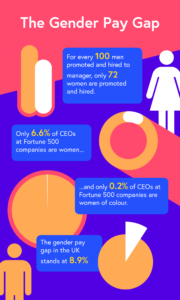How to negotiate your salary with Hustle Crew
Explore the impact of gender bias at work and meet Abadesi, founder of Hustle Crew and lead educator on Hustle Crew's brand new course: Salary Negotiation for Women in the Workplace.

Researcher and negotiation teacher, Dr Chester Karrass, wrote that ‘In business as in life, you don’t get what you deserve, you get what you negotiate’.
Hustle Crew’s brand new negotiation course has just launched on FutureLearn and – thanks to the work of Hustle Crew founder, Abadesi Osunsade and her team – women everywhere now have the chance to earn what they deserve when it comes to their salary.
Salary Negotiation for Women in the Workplace provides women at any level of their career with a blueprint for preparing, practising, and accomplishing a successful salary negotiation.
In this post, we explore the impact of gender bias at work and hear lead course educator Abadesi’s advice for women on realising their worth and earning the salary they deserve.
Join ‘Salary Negotiation for Women in the Workplace’
Understanding gender bias in the workplace
Bias exists in all of us. Our brains are naturally programmed to cope with complexities in the world by categorising the things around us. However, this simplification can also lead to prejudice, as we unconsciously assign stereotypes and treat people or groups of people differently.
When it comes to gender bias at work, there is a huge amount of research which points to men – specifically white, heterosexual males – receiving preferential treatment solely on the basis of their sex and race.
Not only are women paid less than men overall – the current gender pay gap in the UK stands at 8.9% – but it has also been proven that women are unfairly treated when it comes to interviews, performance reviews, and promotions.
In fact, a recent report by Mckinsey found that for every 100 men promoted to manager in the US in 2019, only 72 women were promoted (or 68 Latina women and 58 black women).
Tellingly, only 6.6% of CEOs at Fortune 500 companies are women, and only 0.2% of CEOs at Fortune 500 companies are women of colour. 
All of this means women have to work harder and shout louder than their male counterparts to progress in the workplace. But of course – it’s not that simple.
Likability penalty research has shown that women are also penalised when they behave in ways that violate gender stereotypes. Abadesi explains: “Likeability came into popular discussion when Sheryl Sandberg, the COO of Facebook, said that as she became more successful, she noticed the double standards between men and women in the workplace even more”.
She continues:
“While men are expected and even encouraged to be assertive, when women display assertive traits they are more likely to be interpreted negatively. Where men’s confidence is seen as a likeable trait, women displaying confidence can have the opposite effect and make us unlikeable. It leaves many of us in a catch 22 where we’re forced to act so pleasantly that no one thinks we can handle big challenges but when we insist we can we’re seen as aggressive.”
This is reflected in research from gender bias studies which show that even though women and men ask for pay rises at the same rate, women actually receive a pay rise 5% less often.
Abadesi has found that, unfortunately, to rise in a workplace not optimised for them, “women have to make difficult personal choices around how to behave in a patriarchal society at workplaces where leadership is predominantly male.”
So, in a working world where they are penalised for being too successful and penalised for not shouting about their successes enough, how can women advocate for themselves in order to earn their worth?
How to negotiate a pay rise
According to Abadesi, when it comes to unlocking the salary they deserve, women must be tactical. She advises that it’s important to plan ahead and start the conversation early: “You don’t want your employer to be surprised or caught off guard”.
A negotiation is always daunting and the best way to alleviate those feelings is to prepare ahead of time. Abadesi recommends considering past negotiations and what went well or didn’t:
“Perhaps you were caught off guard, in which case rehearsing the conversation with a friend could be a great help. Perhaps you felt you lacked relevant information about your market rate, in which case you should explore sites like Glassdoor and Indeed for that information.”
She points out that it’s worth remembering women tend to underestimate themselves in the workplace, “so always aim for the upper end of the brackets you find when looking at ads of similar jobs.”
Abadesi has also found that one way of confronting your employer if they invalidate your concerns over male privilege or deny your pay evaluation request, is to use the data that’s out there to back up any complaints of unfair treatment:
“It’s important to have data points like gender bias studies at hand, so when you see bias at play […] you have relevant data to come back with to challenge them.”
What to do when a salary negotiation doesn’t go to plan
The stress around asking for a pay rise can often become so much that it seems easier to avoid the conversation altogether.
However, it’s worth thinking about where these feelings come from in the first place and asking yourself – what’s the worst that can happen?
Abadesi maintains that one of the first steps of negotiation is to come to terms with what you fear the most:
“For many of us, that’s rejection. Visualising a rejection can actually be a powerful way to build your confidence around the upcoming conversation. Confronting one of the things we’re most afraid of helps us turn it from the unknown into a knowable possibility that we can conquer.”
If your employer does say no, it doesn’t need to be over. As Abadesi acknowledges, “Negotiations can be very draining. You have the option of revisiting the conversation in future or exploring other options. It could be valuable to revisit your motivations and priorities and consider what the best next step would be in light of those”.
Ultimately, Abadesi says, it’s vital to put your own wellbeing first: “your mental health and dignity comes above all else. Only ever be tactical in a way that feels true to your values and motivations”.
Salary Negotiation for Women in the Workplace offers an in-depth exploration of the themes discussed in this article, as well as the up-to-date knowledge and support you need to create a bulletproof plan for earning the salary increase you deserve. Additionally, you can discover and make use of the top 8 salary negotiation tips for women.




